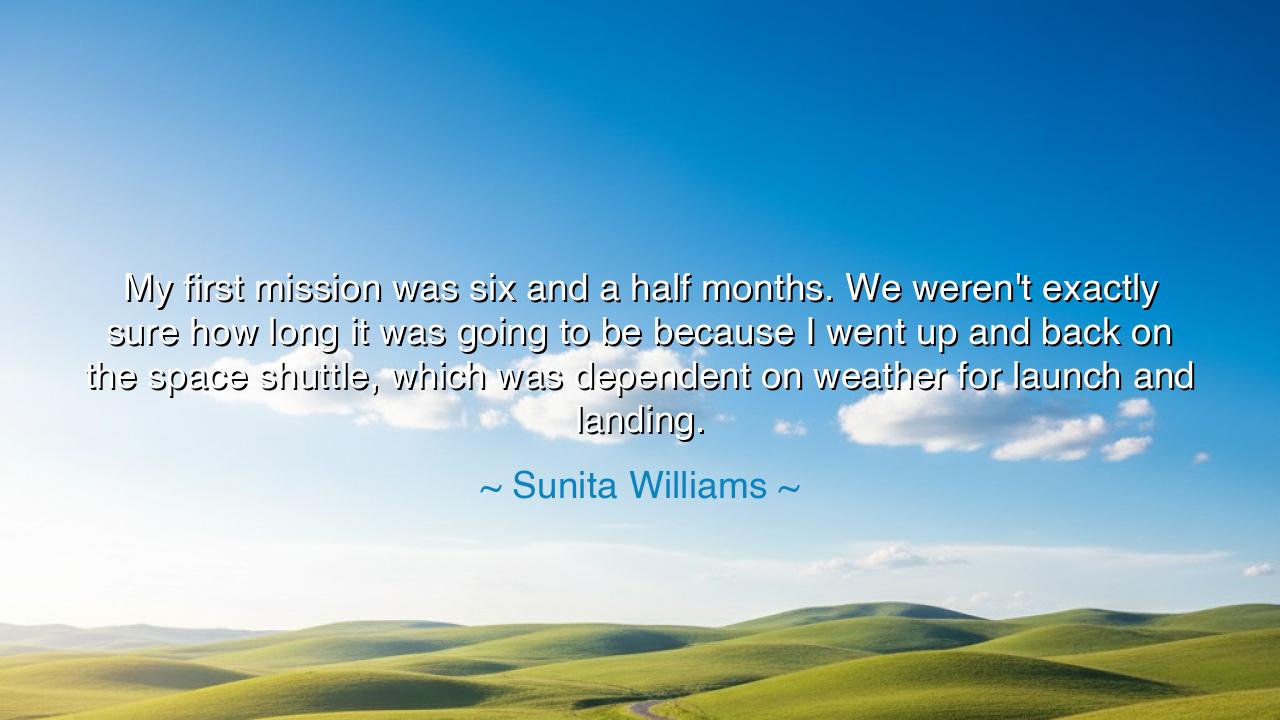
My first mission was six and a half months. We weren't exactly
My first mission was six and a half months. We weren't exactly sure how long it was going to be because I went up and back on the space shuttle, which was dependent on weather for launch and landing.






Hear the words of Sunita Williams, voyager of the heavens and servant of mankind, who declared: “My first mission was six and a half months. We weren’t exactly sure how long it was going to be because I went up and back on the space shuttle, which was dependent on weather for launch and landing.” At first, these words appear as the simple remembrance of an astronaut describing her journey. Yet beneath them lies the eternal lesson of uncertainty, of patience, and of trust in forces greater than ourselves. For here is the truth: even in the age of rockets and stars, the destiny of man is still bound by the fragile hand of weather, the unseen power of earth and sky.
The origin of this saying rests in Williams’ own voyage aboard the International Space Station. Though trained with discipline, though armed with science and technology, she and her fellow travelers could not fix the length of their sojourn. It was not only the schedules of men but the conditions of nature that determined their return. Thus, she lived not by certainty but by readiness, dwelling half a year in orbit, awaiting the moment when the clouds and winds of earth would permit her safe descent. Such is the fate of those who walk the path of exploration: their courage is not only in departing, but in waiting with patience for the appointed hour of return.
So too have the ancients known this truth. Mariners who set forth upon vast oceans could not command the winds or silence the storms. They could prepare their sails, strengthen their ships, and discipline their crews, but their fate was always in part dependent upon the sky above and the sea beneath. Thus, the great Admiral Zheng He, commanding mighty fleets across the Indian Ocean, often delayed or lengthened his voyages until the monsoon winds favored his sails. Like Williams, his missions were measured not only by human will, but by the rhythm of nature.
The deeper meaning of Williams’ words is heroic in its humility. She reminds us that in the greatest of human achievements—dwelling in orbit, building stations among the stars—there still abides the limit of forces beyond our control. The mission stretched longer than expected, not because of failure, but because life is never wholly predictable. In this recognition there is wisdom: greatness is not in mastering all things, but in enduring when the unknown shapes our path. To live is to move between control and surrender, between planning and patience.
Her experience is also a mirror of life itself. We embark upon journeys—careers, families, dreams—hoping to know the timing and the length. Yet, like astronauts or sailors, we soon discover that destiny is not always ours to command. Weather changes, storms arise, delays stretch our patience. What matters is not that the path is uncertain, but that we remain faithful to the mission, enduring until the moment comes when the winds favor our return.
The lesson is clear: prepare as though all things depend upon you, but wait with patience as though all things depend upon forces greater than you. In this balance lies wisdom. Do not despair when plans stretch longer than expected; do not curse the delays that test your spirit. Instead, embrace them as part of the great rhythm of life, for in waiting you are being shaped, tempered, and readied.
Practical actions flow from this wisdom. In your own journey, whether great or small, expect the unexpected. Train yourself not only to begin with courage but to endure with patience. Build flexibility into your plans, and fortify your spirit to withstand delays. When circumstances outside your control hold you back, do not surrender to frustration—hold fast to your purpose, for the time of return will come. Like Sunita Williams, remain steadfast in your mission, knowing that the skies will clear, and the path home will open.
Thus, her words must be remembered as teaching, not only of astronauts but of all humankind: the voyage may last longer than we know, the weather may delay our steps, but endurance makes us ready to call the journey complete. Let us then live as she lived—in courage, in patience, in trust—until our own appointed hour of safe return.






AAdministratorAdministrator
Welcome, honored guests. Please leave a comment, we will respond soon